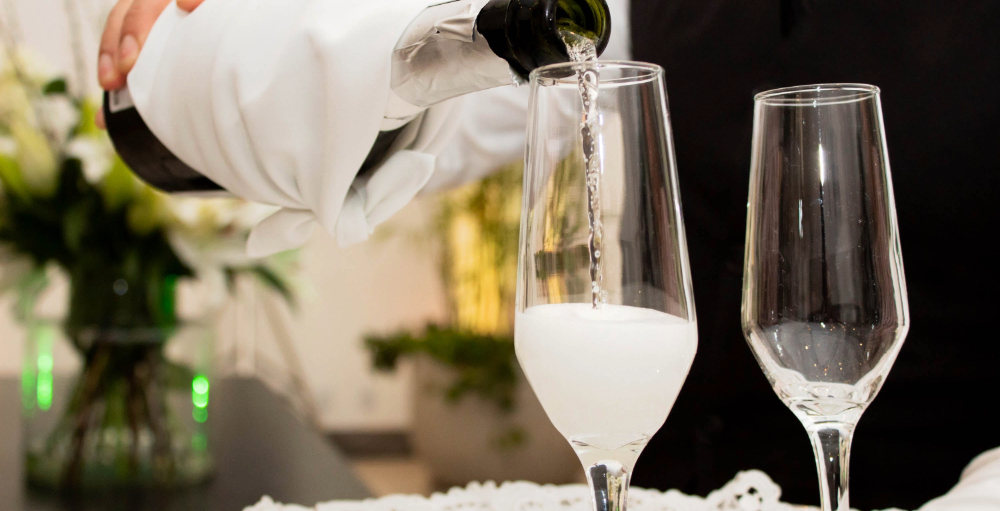New Year’s Eve is one of the biggest party events of the year, with alcoholic beverages being raised in celebration all over the United States. To ensure that everyone can celebrate safely, it’s crucial that anyone serving alcohol in a commercial setting is aware of their responsibilities.
As well as enrolling in a professional Alcohol Server Course (e.g. RBS Training), there are a number of essential techniques that can be employed to ensure safe and responsible service of alcohol on New Year’s Eve. But before we reveal our alcohol safety checklist, let’s discuss the dangers associated with alcohol consumption.
The Dangers of Alcohol Consumption
When consumed in moderation, alcohol can be a relatively safe way of enhancing the party atmosphere. However, it can lead to accidents, health issues, or even violence.
Recent statistics published by the National Institute on Alcohol Abuse and Alcoholism (NIAAA) indicate that almost 5 million Americans need emergency care due to alcohol misuse in 2021, with 140,557 alcohol-related deaths recorded during the same time period.
Underage drinking is another significant issue that shouldn’t be ignored. Young people are particularly vulnerable to the biological effects of alcohol, making them even more susceptible to harm. This is why it’s against the law to serve alcohol to minors in the United States.
Legal compliance is essential in order to avoid penalties such as license suspension, fines or imprisonment. Not only that, but it also safeguards your reputation within the hospitality industry by ensuring that you take on the ethical responsibilities of safe alcohol service.
Now that we’ve outlined the importance of responsible service, it’s time to explore the best ways to keep revelers safe when serving them alcohol on New Year’s Eve.
9 Ways to Ensure Safe Alcohol Service on New Year’s Eve
1. Know Your Audience
Before the event, understand your guest list. Are there any minors? What are the general drinking habits of your attendees? This knowledge will help you plan the amount and type of alcohol to serve.
2. Check Identification
Make it a standard procedure to check the ID of any guest who appears to be under the legal drinking age.
3. Plan Your Drink Menu Wisely
Offer a variety of non-alcoholic beverages for designated drivers and those who prefer not to drink alcohol. Consider serving drinks with lower alcohol content and promote moderate consumption through portion control.
4. Be Aware of High-Risk Cocktail Ingredients
Some cocktails include high-risk ingredients such as raw egg whites and dairy products. These can cause foodborne illnesses or allergic reactions if not stored or handled correctly. Take extra care to follow food safety protocols when using these ingredients.
5. Handle Ice Correctly
It’s often overlooked, but ice can also become a foodborne illness risk if handled incorrectly. To safely handle ice, utilize clean and sanitized utensils like scoops or tongs instead of bare hands. Avoid using glasses as scoops and keep the ice area free from potential contaminants like garbage or dirty dishes.
6. Monitor Consumption
Keep an eye on how much your guests are drinking. Encourage servers to track the number of drinks served to each guest and be prepared to stop service if necessary. Service should also be refused in cases where an individual is clearly intoxicated or behaving aggressively.
7. Offer Food and Water
Food can slow the absorption of alcohol and water is an effective way to prevent harm caused by alcohol-related dehydration.
8. Promote Safe Transportation
Encourage the use of public transit, designated drivers, taxi services and ride-sharing apps wherever possible. Consider partnering with local companies to offer discounted rates for your guests.
9. Train Your Staff
Ensure all staff members engaged in alcohol service have completed a recognized Alcohol Server Course, such as BASSET or RBS Training. They should be well-versed in checking IDs, spotting signs of intoxication, and understanding when and how to refuse service.
Alcohol Server Training
Alcohol server training equips individuals with the knowledge and skills necessary to serve alcohol in a safe and responsible manner. The goal is to minimize the risks associated with alcohol consumption, including underage drinking, overconsumption, and drunk driving. By understanding the laws, recognizing the signs of intoxication and knowing how to refuse service tactfully, servers can significantly reduce the potential for alcohol-related incidents.
The Userve Alcohol Server Course features four distinct sections, covering laws and regulations, social impacts of alcohol, physiological impacts of alcohol and intervention techniques.
Social Impacts of Alcohol
Social events and alcohol often go hand-in-hand, especially on New Year’s Eve. Although most partygoers will remain sensible with their alcohol consumption, staff still need to exercise caution when serving alcoholic beverages as the consequences of excessive drinking can be severe.
This part of the Alcohol Server Course outlines these consequences, giving participants a better understanding of the impact alcohol can have on society if it isn’t served in a safe and responsible manner. Students are informed of their responsibilities as an alcohol server and given insights into how their actions may influence drinking habits for better or worse.
Impacts of Alcohol on the Body
To fully appreciate the importance of safe alcohol service, you must first understand the effects that alcohol can have on the human body. This section of the course takes a closer look at the biological impact of alcohol consumption, with a focus on serving sizes, BAC levels, and signs of intoxication.
Topics include:
- Standard servings of alcohol
- How the body processes alcohol
- How to estimate a person’s Blood Alcohol Concentration (BAC) using a BAC chart
- Factors that impact BAC
- Common myths about sobering up
Laws and Regulations Related to Alcohol Service
Alcohol service laws and regulations vary slightly throughout the United States. Licensed venues need to be familiar with the requirements in their specific state and adhere to them meticulously in order to ensure customer wellbeing and legal compliance.
In this part of the Userve Alcohol Server Course, participants are given an overview of roles and responsibilities of various stakeholders, such as the liquor authority, law enforcement agencies and employers. The program also includes information regarding state-specific regulations and liabilities concerning the service of alcohol.
Intervention Techniques
Not only is it illegal to serve alcohol to intoxicated or underage guests, but it can also lead to serious health and safety issues.
As well as outlining some useful approaches to age and ID verification, this section of the course teaches participants how to deal with challenging situations involving intoxicated customers:
- Acceptable and unacceptable forms of ID
- Proper techniques for checking IDs
- Ways to refuse service to intoxicated customers
- How to stop service while maintaining a safe environment for customers and coworkers
Alcohol Server Certification
State requirements regarding Alcohol Server Certification vary, but below are some examples of rules that are currently imposed in the United States:
- Licensed venues must ensure that all alcohol serving staff have a valid Alcohol Server Certificate.
- Alcohol servers must renew their certificate every three years.
- A supervisor with a valid Alcohol Server Certificate must be onsite during hours of service.
Employers must adhere to state-specific training standards otherwise they may face disciplinary action, including violation penalties. To help ensure that employees obtain the correct certification for their region, Userve offers Alcohol Server Courses approved by the relevant states. This includes accredited training programs for California, Illinois and Michigan.
California Responsible Beverage Service (RBS) Certification Training
Userve is authorized to deliver the RBS Certification Training Program in accordance with the requirements set by the California Department of Alcoholic Beverage Control (ABC).
California Assembly Bill 1221 states that alcohol servers working on-premises in the state of California must participate in an accredited RBS Training Program and pass the RBS Certification Exam before serving alcohol to the public. To achieve certification, the exam needs to be passed within 30 days of finishing the RBS Training Course. Certificates must be renewed every three years.
Illinois BASSET Certification Training
Beverage Alcohol Sellers and Servers Education and Training (BASSET) is a requirement for all on-premises and off-premises alcohol servers in the state of Illinois.
Userve provides a BASSET Certification Training Program approved by Illinois Liquor Control Commission (ILCC). This accessible route to certification ensures that alcohol is served responsibly and in accordance with Illinois alcohol service legislation.
Michigan Alcohol Server/Seller Training
Userve’s Michigan Alcohol Server/Seller Training & Certification Course includes the training and exam elements required by the Michigan Liquor Control Commission (MLCC). Certification is valid for three years.
Get the Training You Need
Responsible alcohol service is fundamental for a safe NYE celebration. Protect your guests and preserve your business reputation by participating in a professional training program.
The Userve Alcohol Server Course will enhance your knowledge of alcohol service legislation as well as provide a valuable insight into the societal and biological impacts of alcohol. You’ll also be taught strategies for preventing overconsumption and underage drinking so that you can help guests enjoy themselves safely.
Enroll with Userve today to secure your place on a training program aligned to your state’s specific requirements, or contact us for help choosing the most suitable course for you and your business.

